高考英语之虚拟语气归纳整理
- 格式:doc
- 大小:71.00 KB
- 文档页数:10
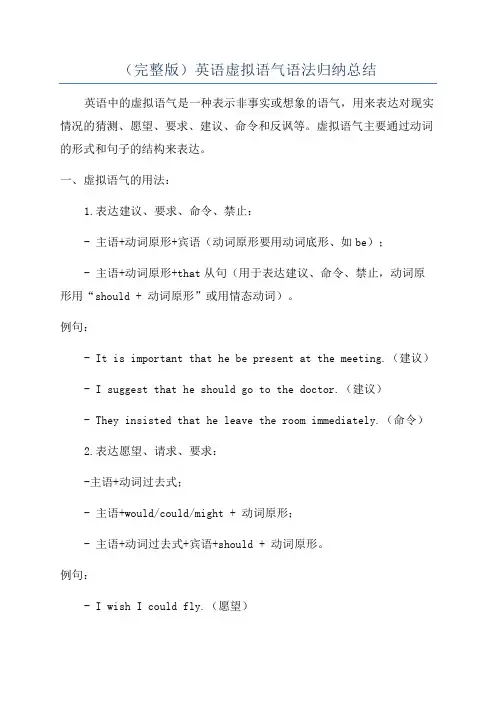
(完整版)英语虚拟语气语法归纳总结英语中的虚拟语气是一种表示非事实或想象的语气,用来表达对现实情况的猜测、愿望、要求、建议、命令和反讽等。
虚拟语气主要通过动词的形式和句子的结构来表达。
一、虚拟语气的用法:1.表达建议、要求、命令、禁止:- 主语+动词原形+宾语(动词原形要用动词底形、如be);- 主语+动词原形+that从句(用于表达建议、命令、禁止,动词原形用“should + 动词原形”或用情态动词)。
例句:- It is important that he be present at the meeting.(建议)- I suggest that he should go to the doctor.(建议)- They insisted that he leave the room immediately.(命令)2.表达愿望、请求、要求:-主语+动词过去式;- 主语+would/could/might + 动词原形;- 主语+动词过去式+宾语+should + 动词原形。
例句:- I wish I could fly.(愿望)- I would appreciate it if you could help me.(请求)3.表示虚拟条件:- If条件从句中的谓语动词用过去完成时,主句用would/should/might/could + have + 过去分词;- If条件从句中的谓语动词用过去时,主句用would/should/could + 动词原形。
例句:- If I had known his phone number, I would have called him.(虚拟条件)- If you had listened to me, we could have finished the project earlier.(虚拟条件)4.表达建议、要求、祝愿:- If only内部称述 + 主语 + 过去式。
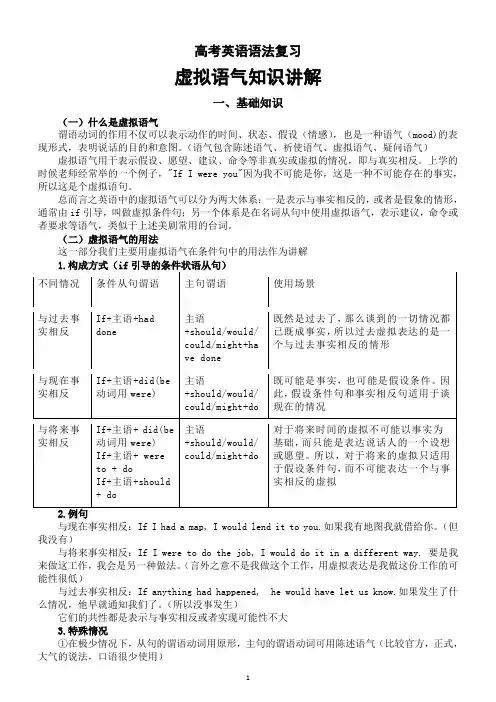
高考英语语法复习虚拟语气知识讲解一、基础知识(一)什么是虚拟语气谓语动词的作用不仅可以表示动作的时间、状态、假设(情感),也是一种语气(mood)的表现形式,表明说话的目的和意图。
(语气包含陈述语气、祈使语气、虚拟语气、疑问语气)虚拟语气用于表示假设、愿望、建议、命令等非真实或虚拟的情况,即与真实相反。
上学的时候老师经常举的一个例子,"If I were you"因为我不可能是你,这是一种不可能存在的事实,所以这是个虚拟语句。
总而言之英语中的虚拟语气可以分为两大体系:一是表示与事实相反的,或者是假象的情形,通常由if引导,叫做虚拟条件句;另一个体系是在名词从句中使用虚拟语气,表示建议,命令或者要求等语气,类似于上述美剧常用的台词。
(二)虚拟语气的用法这一部分我们主要用虚拟语气在条件句中的用法作为讲解与现在事实相反:If I had a map, I would lend it to you.如果我有地图我就借给你。
(但我没有)与将来事实相反:If I were to do the job, I would do it in a different way. 要是我来做这工作,我会是另一种做法。
(言外之意不是我做这个工作,用虚拟表达是我做这份工作的可能性很低)与过去事实相反:If anything had happened, he would have let us know.如果发生了什么情况,他早就通知我们了。
(所以没事发生)它们的共性都是表示与事实相反或者实现可能性不大3.特殊情况①在极少情况下,从句的谓语动词用原形,主句的谓语动词可用陈述语气(比较官方,正式,大气的说法,口语很少使用)If that be the official view, it cannot be accepted.如果这是官方的看法,这是不能接受的。
②if可以省略,但是语序要改为倒装Were I Tom I would refuse.如果我是汤姆我会拒绝。
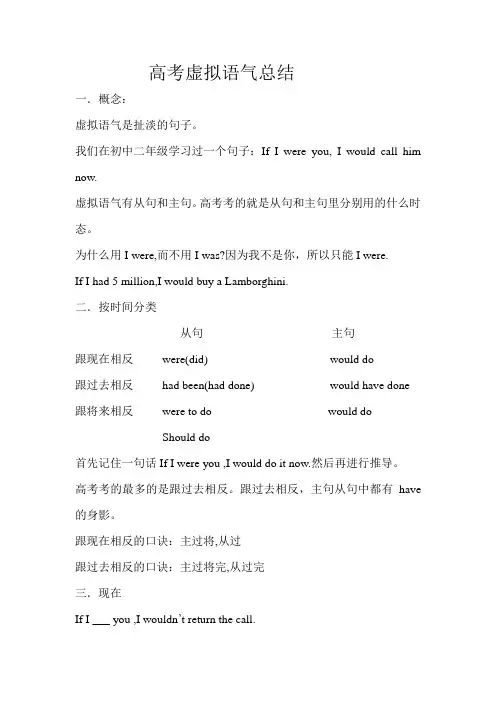
高考虚拟语气总结一.概念:虚拟语气是扯淡的句子。
我们在初中二年级学习过一个句子:If I were you, I would call him now.虚拟语气有从句和主句。
高考考的就是从句和主句里分别用的什么时态。
为什么用I were,而不用I was?因为我不是你,所以只能I were.If I had 5 million,I would buy a Lamborghini.二.按时间分类从句主句跟现在相反were(did) would do跟过去相反had been(had done) would have done 跟将来相反were to do would doShould do首先记住一句话If I were you ,I would do it now.然后再进行推导。
高考考的最多的是跟过去相反。
跟过去相反,主句从句中都有have 的身影。
跟现在相反的口诀:主过将,从过跟过去相反的口诀:主过将完,从过完三.现在If I ___ you ,I wouldn’t return the call.A.BeB.AmC.WasD.WereWere it not for the snowy weather,we ___be all right.A.Would beB.Would have beenC.May beD.Were____I you, I would go with him to the party.A.WasB.Had beenC.Will beD.Were四。
过去If I ____more time,I would have gone with him.A.HadB.Had hadC.Have hadD.Would haveIf we ___here ten minutes earlier, we___the bus. A.Arrived ;would catchB.Arrived; would have caughtC.Had arrived;had caughtD.Had arrived;would have caught五.将来If it were to snow this evening,we would not go out.If it were Sunday tomorrow, I should go to see my grandmother.六.混合虚拟If I were you, I would have taken his advice.If he had listened to the teacher attentively,he would know the answers now.(注意本句中的now)--Could you tell me how to do this excercise?--Well,if you had listened to the teacher yesterday, you would know how to do it now.混合虚拟中有明显的时间状语提示你。
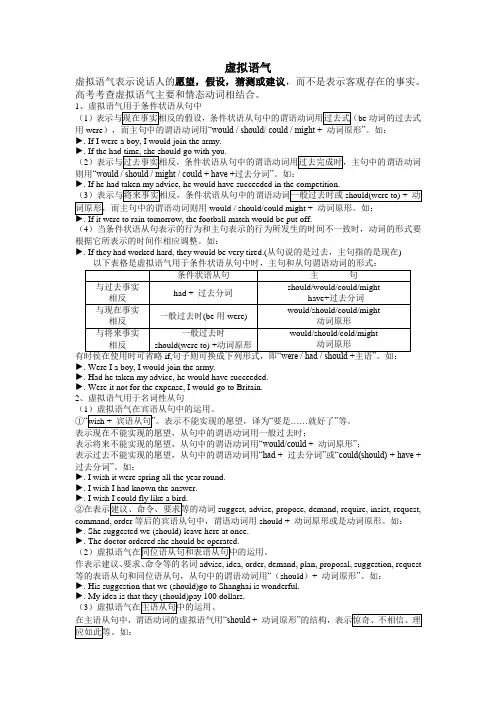
虚拟语气虚拟语气表示说话人的愿望,假设,猜测或建议,而不是表示客观存在的事实。
高考考查虚拟语气主要和情态动词相结合。
1(1be动词的过去式用were”。
如:►. If I were a boy, I would join the army.►(2则用过去分词”►(4)当条件状语从句表示的行为和主句表示的行为所发生的时间不一致时,动词的形式要根据它所表示的时间作相应调整。
如:►. If they had worked hard, they would be very tired.(从句说的是过去,主句指的是现在)►. Were I a boy, I would join the army.►. Had he taken my advice, he would have succeeded.►. Were it not for the expense, I would go to Britain.2、虚拟语气用于名词性从句(①。
表示不能实现的愿望,译为“要是……就好了”等。
表示将来不能实现的愿望,从句中的谓语动词用“would/could + 动词原形”;表示过去不能实现的愿望,从句中的谓语动词用“had + 过去分词”或“could(should) + have + 过去分词”。
如:►. I wish it were spring all the year round.►. I wish I had known the answer.►suggest, advise, propose, demand, require, insist, request,should + 动词原形或是动词原形。
如:►. She suggested we (should) leave here at once.►(2作表示建议、等的表语从句和同位语从句,从句中的谓语动词用“(should)+ 动词原形”。
如:►. His suggestion that we (should)go to Shanghai is wonderful.►(3“should + 动词原形”►. It is necessary (important, natural, strange, etc.) that we should clean the room every day.►. It was a pity (a shame, no wonder, etc.) that you should be so careless.►. It will be desired (suggested, decided, ordered, requested, proposed, etc.) that she should finish her homework this afternoon.注意:这种从句表示的是事实。
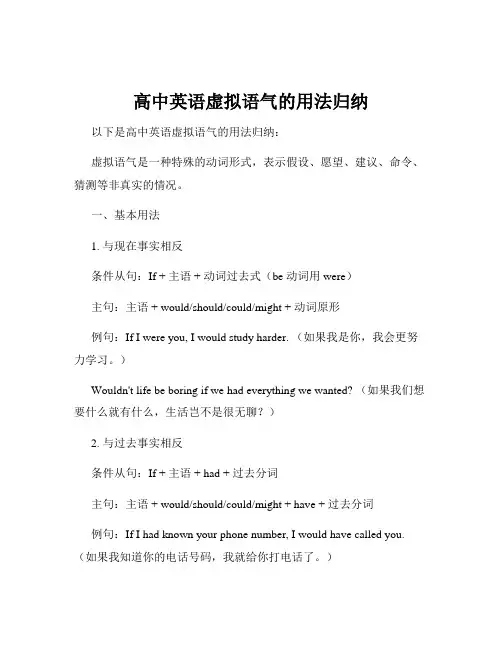
高中英语虚拟语气的用法归纳以下是高中英语虚拟语气的用法归纳:虚拟语气是一种特殊的动词形式,表示假设、愿望、建议、命令、猜测等非真实的情况。
一、基本用法1. 与现在事实相反条件从句:If + 主语 + 动词过去式(be 动词用 were)主句:主语 + would/should/could/might + 动词原形例句:If I were you, I would study harder. (如果我是你,我会更努力学习。
)Wouldn't life be boring if we had everything we wanted? (如果我们想要什么就有什么,生活岂不是很无聊?)2. 与过去事实相反条件从句:If + 主语 + had + 过去分词主句:主语 + would/should/could/might + have + 过去分词例句:If I had known your phone number, I would have called you. (如果我知道你的电话号码,我就给你打电话了。
)Couldn't you have done better if you had tried harder? (如果你再努力些,难道不能做得更好吗?)3. 与将来事实相反条件从句:① If + 主语 + 动词过去式② If + 主语 + were to + 动词原形③ If + 主语 + should + 动词原形主句:主语 + would/should/could/might + 动词原形例句:If it rained tomorrow, we would stay at home. (如果明天下雨,我们就待在家里。
)If she were to come here tomorrow, I would be very happy. (如果她明天来这儿,我会非常高兴。
)If he should fail in the exam, how disappointed his parents would be!(要是他考试不及格,他父母该多失望啊!)二、固定搭配1. wish 后的宾语从句与现在事实相反:从句用一般过去时与过去事实相反:从句用过去完成时与将来事实相反:从句用 would/could + 动词原形例句:I wish I were as tall as you. (我希望我和你一样高。
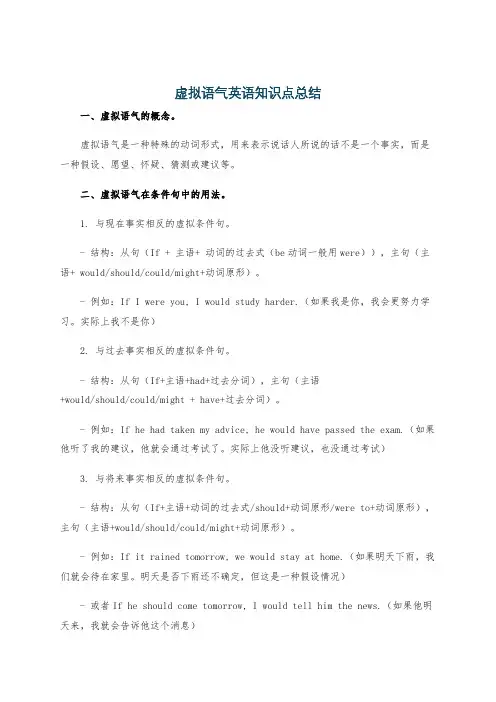
虚拟语气英语知识点总结一、虚拟语气的概念。
虚拟语气是一种特殊的动词形式,用来表示说话人所说的话不是一个事实,而是一种假设、愿望、怀疑、猜测或建议等。
二、虚拟语气在条件句中的用法。
1. 与现在事实相反的虚拟条件句。
- 结构:从句(If + 主语+ 动词的过去式(be动词一般用were)),主句(主语+ would/should/could/might+动词原形)。
- 例如:If I were you, I would study harder.(如果我是你,我会更努力学习。
实际上我不是你)2. 与过去事实相反的虚拟条件句。
- 结构:从句(If+主语+had+过去分词),主句(主语+would/should/could/might + have+过去分词)。
- 例如:If he had taken my advice, he would have passed the exam.(如果他听了我的建议,他就会通过考试了。
实际上他没听建议,也没通过考试)3. 与将来事实相反的虚拟条件句。
- 结构:从句(If+主语+动词的过去式/should+动词原形/were to+动词原形),主句(主语+would/should/could/might+动词原形)。
- 例如:If it rained tomorrow, we would stay at home.(如果明天下雨,我们就会待在家里。
明天是否下雨还不确定,但这是一种假设情况)- 或者If he should come tomorrow, I would tell him the news.(如果他明天来,我就会告诉他这个消息)- 以及If I were to see her tomorrow, I would give her the book.(如果我明天见到她,我就会把书给她)三、虚拟语气在宾语从句中的用法。
1. wish后的宾语从句。
- 表示与现在事实相反的愿望,从句谓语动词用过去式(be动词用were)。
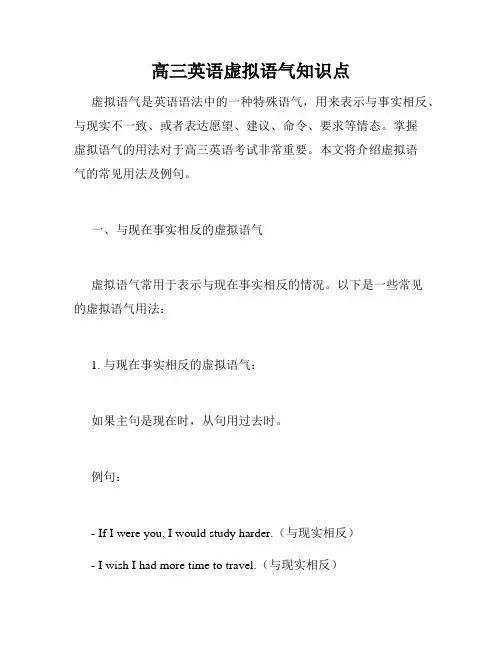
高三英语虚拟语气知识点虚拟语气是英语语法中的一种特殊语气,用来表示与事实相反、与现实不一致、或者表达愿望、建议、命令、要求等情态。
掌握虚拟语气的用法对于高三英语考试非常重要。
本文将介绍虚拟语气的常见用法及例句。
一、与现在事实相反的虚拟语气虚拟语气常用于表示与现在事实相反的情况。
以下是一些常见的虚拟语气用法:1. 与现在事实相反的虚拟语气:如果主句是现在时,从句用过去时。
例句:- If I were you, I would study harder.(与现实相反)- I wish I had more time to travel.(与现实相反)2. 表达建议、要求或命令等的虚拟语气:主句用“should”或“ought to”引导,从句用动词原形。
例句:- It is necessary that she should arrive on time.(建议)- He demanded that they leave immediately.(命令)二、与过去事实相反的虚拟语气虚拟语气还可以用来表示与过去事实相反的情况。
以下是一些常见的虚拟语气用法:1. 与过去事实相反的虚拟语气:如果主句是过去时,从句用过去完成时。
例句:- If he had studied harder, he would have passed the exam.(与过去事实相反)- I wish I hadn't eaten so much.(与过去事实相反)2. 表达愿望、建议或命令等的虚拟语气:主句用“should”或“ought to”引导,从句用动词原形或过去时。
例句:- It is high time that he applied for a job.(建议)- I wish he would stop talking.(愿望)三、与将来事实相反的虚拟语气虚拟语气还可以用来表示与将来事实相反的情况。
以下是一些常见的虚拟语气用法:1. 与将来事实相反的虚拟语气:如果主句是将来时,从句用过去完成时。
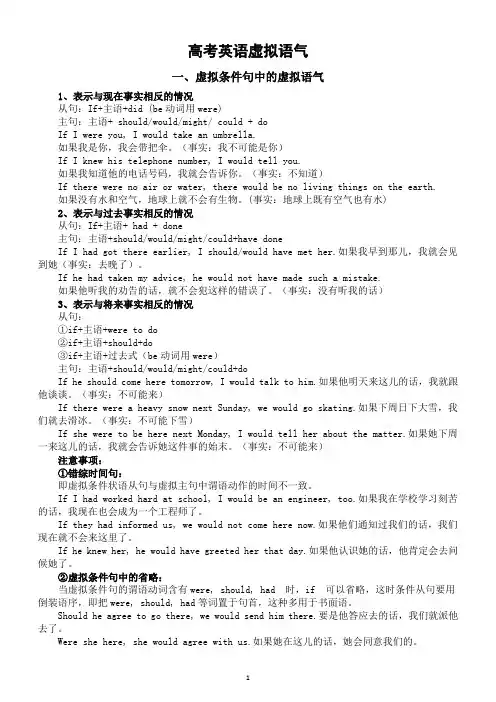
高考英语虚拟语气一、虚拟条件句中的虚拟语气1、表示与现在事实相反的情况从句:If+主语+did (be动词用were)主句:主语+ should/would/might/ could + doIf I were you, I would take an umbrella.如果我是你,我会带把伞。
(事实:我不可能是你)If I knew his telephone number, I would tell you.如果我知道他的电话号码,我就会告诉你。
(事实:不知道)If there were no air or water, there would be no living things on the earth.如果没有水和空气,地球上就不会有生物。
(事实:地球上既有空气也有水)2、表示与过去事实相反的情况从句:If+主语+ had + done主句:主语+should/would/might/could+have doneIf I had got there earlier, I should/would have met her.如果我早到那儿,我就会见到她(事实:去晚了)。
If he had taken my advice, he would not have made such a mistake.如果他听我的劝告的话,就不会犯这样的错误了。
(事实:没有听我的话)3、表示与将来事实相反的情况从句:①if+主语+were to do②if+主语+should+do③if+主语+过去式(be动词用were)主句:主语+should/would/might/could+doIf he should come here tomorrow, I would talk to him.如果他明天来这儿的话,我就跟他谈谈。
(事实:不可能来)If there were a heavy snow next Sunday, we would go skating.如果下周日下大雪,我们就去滑冰。
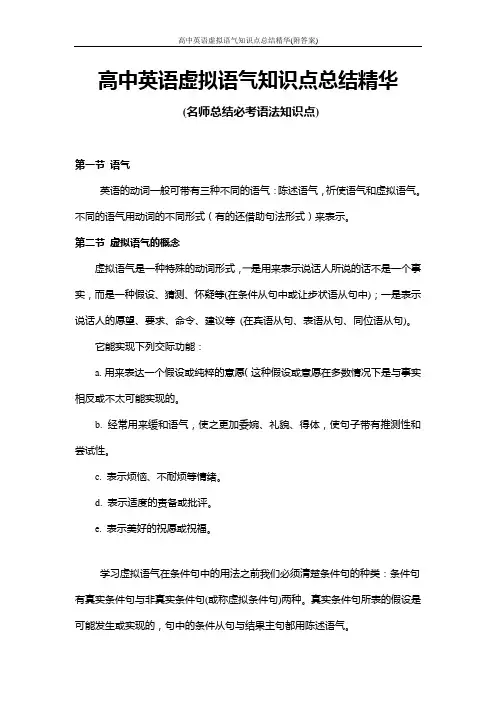
高中英语虚拟语气知识点总结精华(名师总结必考语法知识点)第一节语气英语的动词一般可带有三种不同的语气:陈述语气,祈使语气和虚拟语气。
不同的语气用动词的不同形式(有的还借助句法形式)来表示。
第二节虚拟语气的概念虚拟语气是一种特殊的动词形式,一是用来表示说话人所说的话不是一个事实,而是一种假设、猜测、怀疑等(在条件从句中或让步状语从句中);一是表示说话人的愿望、要求、命令、建议等(在宾语从句、表语从句、同位语从句)。
它能实现下列交际功能:a.用来表达一个假设或纯粹的意愿(这种假设或意愿在多数情况下是与事实相反或不太可能实现的。
b. 经常用来缓和语气,使之更加委婉、礼貌、得体,使句子带有推测性和尝试性。
c. 表示烦恼、不耐烦等情绪。
d. 表示适度的责备或批评。
e. 表示美好的祝愿或祝福。
学习虚拟语气在条件句中的用法之前我们必须清楚条件句的种类:条件句有真实条件句与非真实条件句(或称虚拟条件句)两种。
真实条件句所表的假设是可能发生或实现的,句中的条件从句与结果主句都用陈述语气。
如:If it doesn’t rain tomorrow, I wi ll go for a picnic. 假若明天不下雨,我就去野餐。
Oil floats if you pour it on water. 你如把油倒在水里,油就浮起来。
虚拟条件句所表的假设则是不可能或不大可能发生或实现的,句中的条件从句与结果主句皆须用虚拟语气。
第三节虚拟语气在条件句中NOTE:使用虚拟条件句要注意的几点:1.当条件状语从句表示的行为和主句表示的行为所发生的时间不一致时,被称为:错综时间条件句“,动词的形式要根据它所表示的时间作出相应的调整.If you had followed my advice , you would be better now.如果你听我的建议,你现在就会痊愈了.2.在条件句中,可省略if,把were ,had, should 提到句首,变为倒装句式.(后面详细讲解)If you had come earlier, you would have met him.Had you come earlier, you would have met him.1. 与现在事实相反的虚拟条件句,条件从句的谓语用动词的过去式(be的过去式用were), 主句的谓语用should (would, might,could)+动词原形。

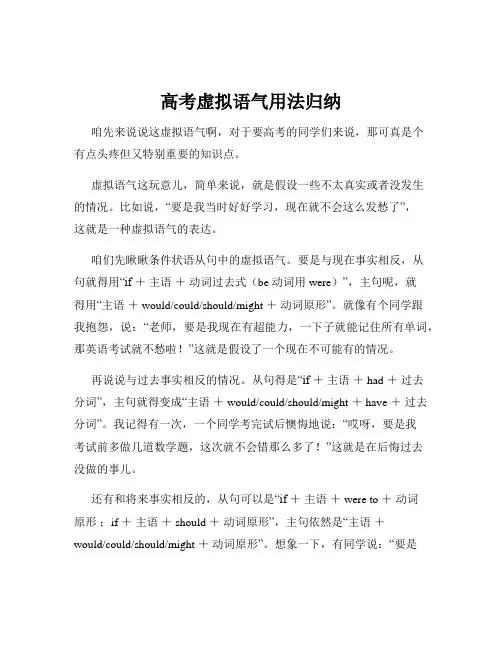
高考虚拟语气用法归纳咱先来说说这虚拟语气啊,对于要高考的同学们来说,那可真是个有点头疼但又特别重要的知识点。
虚拟语气这玩意儿,简单来说,就是假设一些不太真实或者没发生的情况。
比如说,“要是我当时好好学习,现在就不会这么发愁了”,这就是一种虚拟语气的表达。
咱们先瞅瞅条件状语从句中的虚拟语气。
要是与现在事实相反,从句就得用“if +主语+动词过去式(be 动词用 were)”,主句呢,就得用“主语+ would/could/should/might +动词原形”。
就像有个同学跟我抱怨,说:“老师,要是我现在有超能力,一下子就能记住所有单词,那英语考试就不愁啦!”这就是假设了一个现在不可能有的情况。
再说说与过去事实相反的情况。
从句得是“if +主语+ had +过去分词”,主句就得变成“主语+ would/could/should/might + have +过去分词”。
我记得有一次,一个同学考完试后懊悔地说:“哎呀,要是我考试前多做几道数学题,这次就不会错那么多了!”这就是在后悔过去没做的事儿。
还有和将来事实相反的,从句可以是“if +主语+ were to +动词原形;if +主语+ should +动词原形”,主句依然是“主语+would/could/should/might +动词原形”。
想象一下,有同学说:“要是明天世界末日,今天我就啥也不学,尽情玩!”虽然这事儿不太可能,但就是这种假设的虚拟语气。
虚拟语气在宾语从句里也有讲究。
比如说,wish 后的宾语从句,与现在事实相反用一般过去时;与过去事实相反用过去完成时;与将来事实相反用 would/could +动词原形。
我曾经听到一个同学许愿说:“真希望我现在是个学霸,啥题都会做!”这就是典型的与现在事实相反的虚拟语气表达。
还有在主语从句中,“It is +形容词(或过去分词)+that”结构中,如果形容词或过去分词表示“建议、要求、命令”等,从句的谓语动词要用“should +动词原形”,should 可以省略。
高考英语中虚拟语气的用法和注意点是什么在高考英语中,虚拟语气是一个重要的语法点,也是让许多同学感到头疼的部分。
虚拟语气用于表达与事实相反、假设、愿望、建议等情况,它的用法多样,且有不少需要注意的地方。
接下来,咱们就详细地探讨一下高考英语中虚拟语气的用法和注意点。
一、虚拟语气在条件句中的用法1、与现在事实相反条件从句用一般过去时(be 动词用 were),主句用“would / could / should / might +动词原形”。
例如:If I were you, I would take the job (如果我是你,我会接受这份工作。
)2、与过去事实相反条件从句用过去完成时,主句用“would / could / should / might + have +过去分词”。
比如:If you had studied harder, you would have passed the exam (如果你学习更努力些,你就会通过考试了。
)3、与将来事实相反条件从句有三种形式:① should +动词原形;② were to +动词原形;③一般过去时。
主句用“wou ld / could / should / might +动词原形”。
举个例子:If it should rain tomorrow, we would stay at home (要是明天下雨,我们就待在家里。
)二、虚拟语气在宾语从句中的用法1、 wish 后的宾语从句表示与现在事实相反,用一般过去时;表示与过去事实相反,用过去完成时;表示与将来事实相反,用“would / could +动词原形”。
例如:I wish I were as tall as you (我希望我和你一样高。
)2、表示“建议、要求、命令”等动词后的宾语从句这类动词有suggest(建议)、advise(建议)、insist(坚持要求)、order(命令)、demand(要求)等,从句谓语用“should +动词原形”,should 可以省略。
高中英语虚拟语气知识点总结嘿,同学们!今天咱来好好唠唠高中英语虚拟语气这个知识点哈。
先来说说啥是虚拟语气,简单来讲,就是那些假设的、不太可能发生或者与现实不一样的情况要用的一种语气。
就好比啊,我有一天做梦,梦到我变成了超级英雄,可以在天上飞来飞去,这就是虚拟的嘛,现实中我可没这本事。
咱看哈,要是表示与现在事实相反,那谓语动词就得这么变:主句用“would/could/should/might + 动词原形”,从句用“一般过去时”。
比如说“要是我现在是个百万富翁,我就天天吃大餐”,那就是“If I were a millionaire now, I would eat big meals every day.”。
再说说与过去事实相反的情况,主句用“would/could/should/might + have + 过去分词”,从句用“过去完成时”。
我记得有一次考试,有道题我明明会做,可就是粗心做错了,哎呀,我当时就想啊,“要是我考试的时候细心点,我就不会丢这分了”,这就是“If I had been more careful in the exam, I might not have lost this score.”。
还有与将来事实可能相反的,主句用“would/could/should/might + 动词原形”,从句有三种情况,“were to do”“should do”或者“一般过去时”。
就像我想着要是将来有一天我能去外星球旅行,那可太棒啦,“If I were to travel to an alien planet in th e future, that would be really great.”哎呀,这虚拟语气啊,可得好好学,不然做题的时候就容易迷糊啦。
咱平时多练习练习,多造几个句子,慢慢就掌握啦。
相信大家都能把虚拟语气学好,加油哦!这样以后遇到相关题目就都能轻松搞定啦,就像我在梦里当超级英雄一样厉害呢!哈哈!。
高考英语语法考点归纳总结:高考英语语法:虚拟语气一.概念: 动词虚拟语气表示说话人的愿望, 假设, 猜测, 建议, 请求, 意图, 设想等未能或不可能成为事实的情况, 或者在说话人看来实现可能性很小的情况, 而不表示客观存在的现实二.虚拟语气的表现形式: 通过句中谓语动词的特殊形式来表现. 这些特殊形式与谓语动词的某些时态相同, 但它们只表示语气, 而不表示时态, 但含有一定的时间概念虚拟语气的用法一.虚拟语气在简单句中的用法: 谓语动词用原形或may +动词原形1.表示祝愿a. Long live our country.b. May you succeed.c. May you be happy all your life.2.表示命令a. Everybody leave the room.二.虚拟语气在非真实条件句中的用法: (使用虚拟语气的含条件句的复合句称为真实条件句)1.表示与现在事实相反的情况时, if从句的谓语用动词的过去式 (be动词的过去式多用were, 而不用was), 主句的谓语用should / would / could / might +动词原形 (should 多用于第一人称, would多用于二三人称, could / might可用于所有人称)a. If I had more time, I should study computer better.b. If he were not so busy, she would attend the meeting this afternoon.c. If they didn’t take exercises every day, they wouldn’t be so healthy.d. If you went to bed earlier, you would not be so sleepy in the morning.e. If she invited me, I should go to the party.2.表示与过去事实相反的情况时, if从句的谓语用had done形式, 主句的谓语用should / would / could / might + have done的形式a. If she had invited me yesterday, I should have gone to the party.b. I would have checked my paper again if I had had more time at yesterday’s exam.c. If you had taken the teacher’s advice, you would not have failed in the exam.3.表示与将来事实相反的情况时, if从句的谓语形式是: ①.完全动词过去式 (be的过去式通常用were); ②.should +动词原形; ③.were to do. 其中②, ③种情况都含有出乎意料之外之意; 主句的谓语的形式是: should / would / could / might +动词原形a. If she should invite me tomorrow, I should go to the party.b. If it rained / should rain / were to rain tomorrow, our picnic would be put off.c. If I saw him tomorrow, I would pass your note to him.d. I might come back if I were to miss the train.三.虚拟语气在非真实条件句中用法的几个变体:1.条件从句省略if: 在书面语中, 如果条件从句中的谓语中有were, had, should等词, 可将if省略, 而把were, had, should放在句首a. Were I you (=If I were you ), I would get up early very early.b. Had you arrived (=If you had arrived ) at the station ten minutes earlier yesterday, you could have caught the train.2.省略条件从句或主句, 省略部分的含义仍有所体现. 省略主句时, 表示己不能实现的愿望a. You could have done it yourself (if you had wanted to).b. I wouldn’t smoke (if I were you).c. If my old friends were with me! (要是老朋友和我在一起该多好啊)d. If you could have seen the wonderful film!3.主从句时间不一致时, 主从句谓语动词的形式取决于要表示的具体时间a. You would speak English well if you had practised speaking it every day.b. If she hadn’t trained so hard, she wouldn’t be able to run so fast.4.假设的条件不以条件从句, 而以其他方式如介词短语、从句等表达出来, 这种句子称为含蓄条件句a. What would you do with a million dollars?b. Without music, the world would be a dull place.c. We could have done better with more money.d. He would have given you more help, but he has been so busy.四.虚拟语气在as if / though从句中的用法:1.表示与现在事实相反或对相在情况有所怀疑, as if / though从句谓语用过去式a. He speaks English so well as if she had studied English in England.b. She looked as if she were ill.2.表示与过去事实相反的情况, as if / though从句谓语用过去完成式a. The machines operated as if it had been repa ired.五.虚拟语气在含even if / though从句的复合句中的用法:在此类复合句中, 若表示与事实相反, 可用虚拟语气形式. 主从句的谓语动词形式与非真实条件句相同a. Even if I were rich, I would work.六.虚拟语气在主语从句中的用法:如果表示说话人的看法, 想法或意见, 在句型 It is / was + adj. + that从句中, 主语从句中可用虚拟语气. 主语从句中谓语动词用should do表示现在或将来情况, 用should have done表示过去情况a. It is necessary that you should clean the lab before you left.b. It is important that you should take the doctor’s advice.c. It was very strange that he should have left without say goodbye.七.虚拟语气在宾语从句中的用法:1.在wish的宾语从句中, 通常表示不可能实现或没有实现的愿望, 常用虚拟语气①.wish的宾语从句用过去式, 表示现在或将来没有实现或不可能实现的愿望a. I wish I knew the result of the match now.b. I wish it were spring here all the year round.c. I wish I could help you.d. I wish I were young.②.wish的宾语从句用过去完成式, 表示过去没有实现或不可能实现的愿望a. We wish we had got the film tickets last night.b. I wish you I had met him yesterday.③.wish的宾语从句若用would, 则一般表示请求, 对现状不满或希望未来有所改变a. I wish the prices would come down.b. I wish you would help me.c. I wish he would be more careful.d. We wish you would spend the holiday with us.2.在动词suggest (建议), advise (建议), demand (要求), require (要求), order (命令), insist (坚持)后的宾语从句中, 谓语动词常用( should )+动词原形的虚拟语气形式a. I suggested that we should go there at once.b. I demand that he should answer me at once.c. The doctor insisted that the patie nt should stay in bed for two weeks.d. The officer ordered that the soldiers should stop playing.与名词suggestion建议 / advice 建议 / demand要求 / request要求 / order命令有关的从句(包括同位语从句和表语从句等)中的谓语也用 ( should ) +动词原形a. The black people made a strong demand that the government ( should ) take steps to change the unfair situation.b. Their demand is that the government should take steps to change the unfair situation.c. I was Bill’s suggestion that everybody should have a map.d. His suggestion was that everybody should have a map.八.虚拟语气用在句型: It is time that(该做某事了)中: that从句中的谓语动词用过去式a. It is time we got up.九.虚拟语气用在if only引导的感叹句中: 表示但愿, 要是就好了, 其中谓语形式与wish 的宾语从句相同a. If only he did n’t drive so fast! ( =I wish he didn’t drive so fast.)b. If only he had take n the doctor’s advice. ( =I wish he had taken the doctor’s advice.)c. If only the rain would stop! ( =I wish the rain would stop.)十.虚拟语气用在would rather / prefer后的that从句中: 表示现在或将来情况谓语动词用过去时形式, 表示过去情况动词用过去完成时形式a. I would rather he came next Saturday.b. I w ould prefer you had seen the film yesterday.c. I would rather that he painted the house blue。
高考英语语法复习情态动词与虚拟语气知识讲解一、情态动词(1)表示能力时,can只用于一般现在时,could仅用于一般过去时;而be able to则有更多的时态,如将来时、完成时等。
I haven’t been able to read that report yet.He will be able to skate as well as you.(2)Was/were able to表示能力时,侧重经过努力而成功做到某事;而could仅表示具备能力,不说明是否实施了能力。
He studied hard and was able to pass the exam.(3)用在其他动词,如might,may,would,want,hope等之后表示能力只能用be able to。
He might be able to fix your car.(1)must还可以表示质问或感情色彩,意为“偏要,偏偏”。
Why must it snow on Saturday?(2)should还可以表示惊奇、愤怒、失望等特殊情感,尤其用在以why,who,how等开头的疑问句中或某些感叹句中。
why should you be so late today?(1)must作“必须”讲的一般疑问句,其肯定回答用must,否定回答用needn’t或don’t have to。
-Must I pay now?-Yes, you must./No, you needn’t.(2)need还可以作实义动词,有人称和数的变化,后跟带to的不定式作宾语。
She needed to go out for a walk.(1)两者在表示过去的习惯动作或行为时常可通用。
When we were children, we would/used to go skating every winter.(2)Used to与would都不能与表示具体频率、次数的词及特定的时间状语或具体的一段时间连用。
高中英语知识点归纳虚拟语气的种类与用法虚拟语气是英语中常见的一种语法现象,用于表示与事实相反、假设或建议等非真实情况。
在高中英语学习中,掌握虚拟语气的种类与用法对于提高语言表达能力至关重要。
本文将归纳总结高中英语中常见的虚拟语气种类及其用法。
一、虚拟语气的种类1. 与过去事实相反的虚拟该类虚拟语气用于表达对过去事实的否定、怀疑或假设,通常由“should/ought to + have + 过去分词”构成。
例如:He should have come to the party last night.(他本应该昨晚来参加派对的)I wish I had studied harder for the exam.(我希望我当时更努力地学习)2. 与现在事实相反的虚拟该类虚拟语气用于表达对现在事实的否定、怀疑或假设,通常由“动词原形+宾语+过去式”构成。
例如:If I were you, I would apologize.(如果我是你,我会道歉)She wishes she had more time for hobbies.(她希望她有更多的时间去爱好)3. 与将来事实相反的虚拟该类虚拟语气用于表达对将来事实的否定、怀疑或假设,通常由“should/shall/would + 动词原形”构成。
例如:If it should rain tomorrow, we would have to cancel the picnic.(如果明天下雨的话,我们将不得不取消野餐)I would help you if I had the time.(如果我有时间的话,我会帮助你的)4. 与现在事实相反的虚拟假设该类虚拟语气用于表达对现在事实的否定、怀疑或假设,通常由“were/shou ld + 动词原形”构成,用于表示与现在事实相反的情况。
例如:If I were you, I would quit that job.(如果我是你,我会辞职的)It is high time that he should start studying.(早该是他开始学习的时候了)二、虚拟语气的用法1. 表示假设和建议虚拟语气常用于表示假设和建议,帮助我们在语言表达中更加灵活地运用条件句和建议句。
概述英语的动词有三种语气形式,即陈述语气、祈使语气和虚拟语气。
陈述语气用来说明事实或就事实提出询问,可用于陈述句、疑问句和某些感叹句中;祈使语气用于表示请求、命令、建议或警告等。
虚拟语气是谓语动词的一种特殊形式,用来表达假设、主观愿望、猜测、建议、可能或空想等非真实情况。
如:He is honest. 他很诚实。
(陈述语气)Don‘t be late next time. 下次别迟到。
(祈使语气)If I were you ,I would not go. 我要是你,我就不会去。
(虚拟语气)I wish I had a lot of money. 要是我有很多很多钱就好了。
(虚拟语气)虚拟语气在条件句中的用法:条件句有真实条件句和虚拟条件句两种。
真实条件句所表示的假设是有可能发生的,此时主句不用虚拟语气;而虚拟条件句则表示一种假想,与事实相反或不大可能会发生,此时用虚拟语气。
如:If I have time,I will go. 假若我有时间,我就去。
(陈述语气)If I were you,I woul d go. 假若我是你,我就去。
(虚拟语气)注:特别说明1、l would/should/could/might主句谓语中的should主要用于第一人称后;would表示结果还表示过去经常常常做某事,might表示可能性,could表示能力、允许或可能性。
比较:If you tried again ,you would succeed. 要是你再试一试,你就会成功的。
(would表结果)If you tried again, you might succeed. 要是你再试一试,你可能会成功的。
(might表可能)If you tried again ,you could succeed. 要是你再试一试,你就能成功了。
(could表能力)2、错综时间虚拟条件句即条件从句与主句所指时间不一致,如从句指过去,而主句即指的是现在或将来,此时应根据具体的语境情况,结合上面提到的三种基本类型对时态作相应的调整:If it had rained last night, the ground would be wet now. 要是昨晚下过雨的话,现在地面就会是湿的。
You would be much better now if you had taken my advice. 假若你当时听我的话,你现在就会好多了。
3、If虚拟条件句的否定(含蓄条件句)常考两个句型:If it weren’t for…和If it hadn’t been for…,其意为“若不是(有)”“要不是”。
如:If it weren’t for water, no plant could grow. 要是没有水植物就无法生长。
If it hadn’t been for your assistance ,we wouldn’t have succeeded.=But for your assistance ,we wouldn’t have succeeded.=Without your assistance ,we wouldn’t have succeeded.4、If虚拟条件句的倒装形式,即把were, had, should置于句首。
例:Were I in school again (= If I were in school again), I would work harder.Had you asked me, I would have told you. (=If you had asked me,…)使用虚拟语气的常见结构或从句:1.*wish与hope接宾语从句的区别在于:hope表示一般可以实现的希望,宾语从句用陈述语气。
wish表示很难或不大可能实现的希望,宾语从句用虚拟语气。
试比较:(1) We hope they will come. (We don’t know if they can come.)(2) We wish they could come. (We know they are not coming.)2.if only 与 I wish一样,也用于表示与事实相反的愿望,其后所虚拟语气的时态与 wish后所接时态的情况相同:If only she had had more courage! 她再勇敢一些就好了。
If only I had listened to my parents! 我要是当时听了父母的话就好了。
If only she would go with me! 她要是愿意和我一道去就好了!*if only 通常独立使用,没有主句。
3.l would rather后句子用虚拟语气只分现在和过去在would rather, would sooner, would just as soon后的that从句中, 句子谓语习惯上要用虚拟语气,表示"宁愿做什么" ,具体用法为:①一般过去时表示现在或将来的愿望I’d rather you went tomorrow (now). 我宁愿你明天(现在)去。
②用过去完成时表过去的愿望I’d rather you hadn’t said it. 我真希望你没有这样说过。
4.l as if (though)从句用虚拟语气以as if (as though)引导的方式状语从句或表语从句,有时用虚拟语气,则与wish用法相同,例:He acts as if he knew me. 他显得认识我似的。
They treat me as though I were a stranger. 他们待我如陌生人。
He talks as if he had been abroad. 他说起话来好像曾经出过国。
注:两点说明(1) 从句所表示的内容若为事实或可能为事实,也可用陈述语气:It looks as if we’ll be late. 我们似乎要迟到了。
(2) 注意It isn’t as if…的翻译:It isn’t as if he were poor. 他不像穷的样子(或他又不穷)。
从句中should+动词原形,should可省略1. 在lest ,for fear that( 以免) ,in case(以防)引导的目的状语从句中的虚拟语气She walked quietly lest she (should)wake up her roommates. 她走得很轻以免吵醒她的室友。
2. 表应当做值得做一类动词后的宾语从句建议advise, suggest, propose, recommend命令order, command请求ask, demand, require, request指示direct敦促urge提议move, vote希望desire坚持insist打算intend安排arrange例如:I insisted that he (should)stay. 我坚持要他留下。
He urged that they go to Europe. 他敦促他们到欧洲去。
He suggested that we should leave early. 他建议我们早点动身。
He ordered that it (should)be sent back. 他命令把它送回去。
I ask that he leave. 我要求他走开。
He requires that I (should)appear. 他要求我出场。
I move that we accept the proposal. 我提议通过这项提案。
He arranged that I should go abroad. 他安排我去国外。
She desires that he do it. 她希望他做此事。
The general directed that the prisoners should be set free. 将军指示释放那些俘虏。
*suggest表“暗示”insist表“坚持认为”不用虚拟语气比较:He insisted that I had read his letter. 他坚持说我看过他的信。
He insisted that I should read his letter. 他坚持要我看他的信。
He suggested that we (should) stay for dinner. 他建议我们留下吃饭。
I suggested that you had a secret understanding with him. 我觉得你与他心照不宣。
3. order,suggestion,idea,plan, proposal, advice, demand等名词后的表语从句或同位语从句Our suggestion is that you( should)be the first to go.我们的建议是你应该第一个去。
4.*advice, agreement, command, decision, decree, demand, determination, indication, insist ence, order, preference, proposal, request, requirement, stipulation, suggestion, idea, plan, orderl “It is (was)+ 紧急重要-- 带感情色彩上述demand/suggest等动词过去分词或important,natural,strange ,necessary,surprised, appropriate等形容词后的主语从句1. It is ordered that the army (should)get there by 4 a.m.2. It is necessary that she (should) be sent there at once.注:*It is necessary,important,strange,natural, advisable, anxious, compulsory, crucial, desirable, eager, essential, fitting, imperative(绝对必要), impossible, improper, obligatory, possible, preferable, probable, recommended, urgent, vital etc. ;it is a pity;It is requested /suggested/desired/proposedIt’s time后的从句用虚拟语气从句谓语通常用过去式表示 (早)该干某事了*有时也用过去进行时或“should+动词原形”(较少见,且should不能省略)ex. It’s time we went [were going, should go]. 我们该走了。